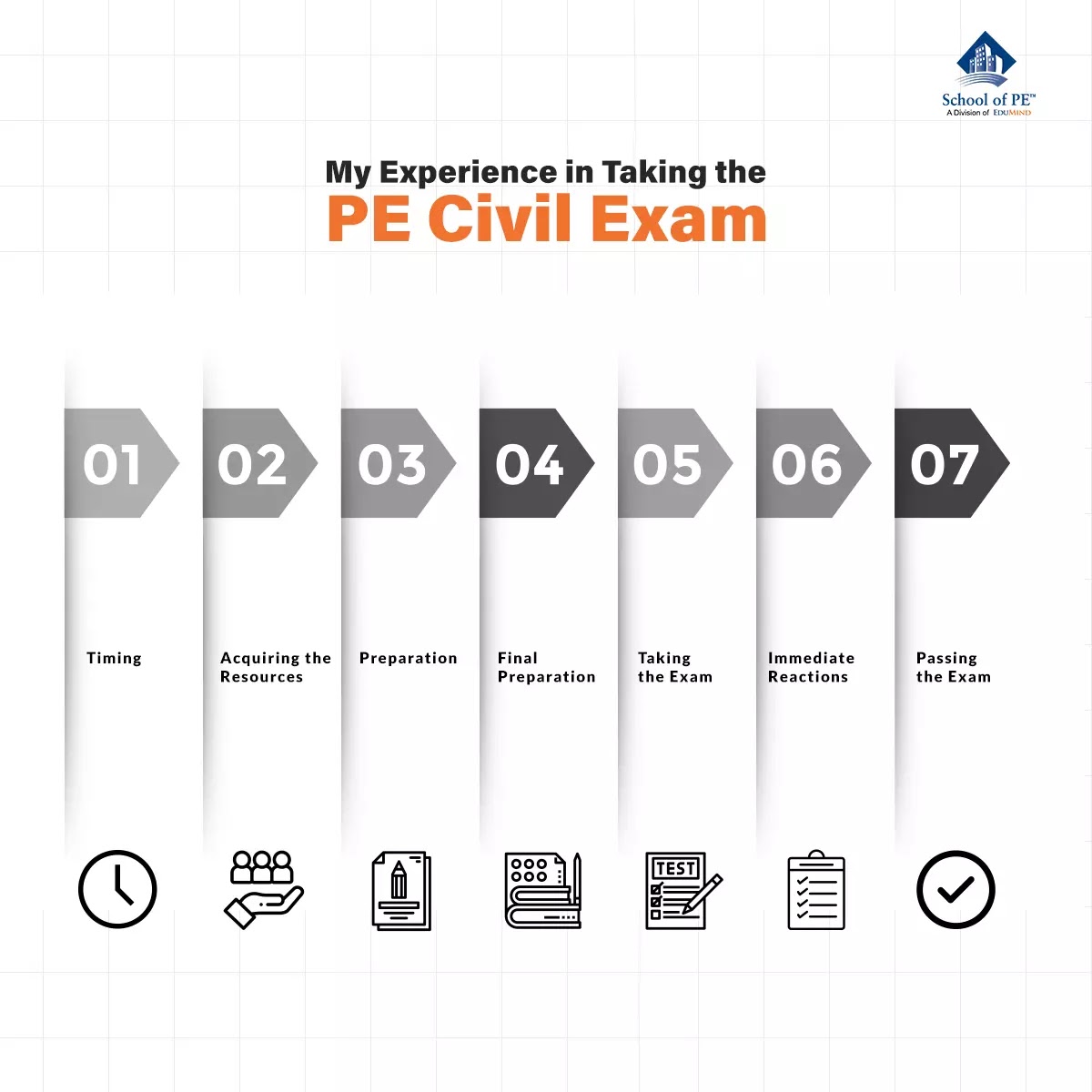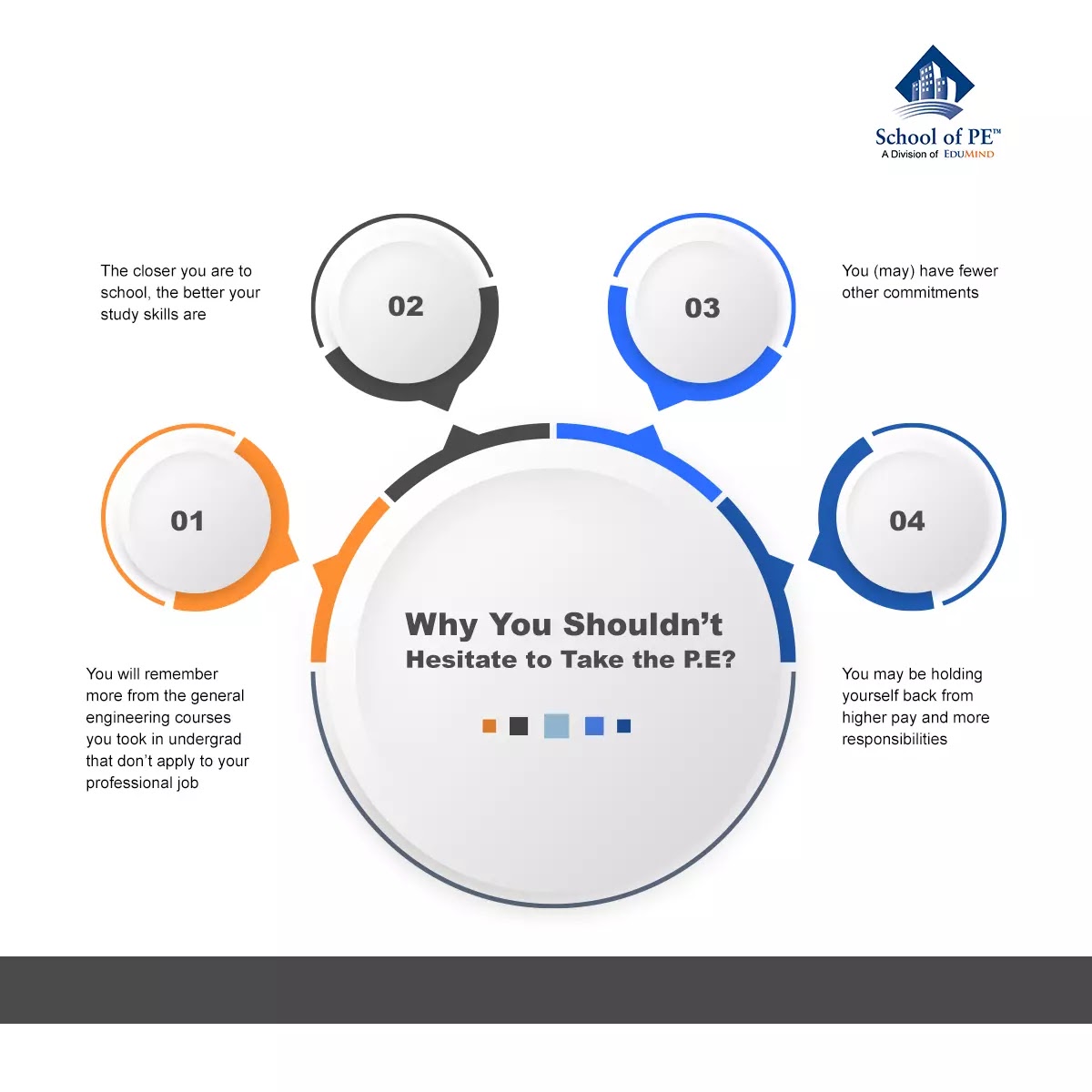The PE exam is one of the most important milestones in an engineer's career. It also usually takes place at least four years after you've been done with school. Because of this, intentional preparation is key to passing the PE exam.
Your preparation should start at least a year before your desired exam date. Find out when you can apply and what the requirements are for your application. You will need a complete engineering work history between when you earned your Civil Engineering degree and the application submittal date. You will also need contact information for all your current and past supervisors (ideally your supervisors are professional engineers who have had direct responsible charge of you). Start your application early and get your current and past supervisors to complete the reference forms early. Submit the completed application as soon as possible.
Once your application is approved and you register for your PE exam, look for a review course that fits your schedule and learning style. Many great courses are offered through the School of PE, including virtual OnDemand, virtual live, and in-person courses. With my work schedule and family life I chose a virtual OnDemand course.
Make a list of all the reference material that is applicable to the exam. Comprehensive lists are available on the exam website but will likely include reference books you may not need. I recommend a general civil engineering reference guide such as the PE Civil Exam Review Guide: Breadth book, but there are many good choices out there. Your review course will also be able to recommend books to take into the exam and may even provide material you can print out and bind to make it authorized to take into the exam.
As you begin your review course make sure you can study in a quiet place free from the distractions of work and life. Block out enough time each week to get through the course several weeks before the exam date. This will allow you to take practice exams prior to the exam and give you time to go back to your review course and reference material in between practice exams. Use page tabs and highlighters to mark key information in the reference material you will be taking into the exam. This will save you a lot of time. Remember, you will only have a few minutes to answer each question.
As you take practice exams, find a quiet place that is as much like the real test environment as possible. I found a quiet conference room with a single table. I only took into the practice exam what I would have with me for the PE exam: my reference books, an approved watch, two approved calculators, scratch paper, and a pencil (the exam proctors will provide scratch paper and pencils). Treat the practice exams as if they were the real exam. Score your practice exam and use the results to figure out what topics need more study.

As the exam date gets closer, gather all of the things you plan to take into the exam in one place. This should include all the reference material (and could be anywhere from 2 or 3 books to 10 or 20 books), two approved calculators (you don't want to have a calculator not work on exam day and be without a backup), an approved watch (you may not be able to see a clock during the exam), ear plugs (when I took the exam it was a windy day and the large room we were in had a lot of noise from the environment), a water bottle, your exam registration if required, approved identification, and a way to get all this to the table where you'll sit for the day. I had over 12 reference books for my PE exam and used a hand cart with milk crates strapped to it to move everything.
Many people take the exam in a location that is several hours away from where they live. Because the exam starts early and you will need to arrive well before the exam begins, you may want to find a hotel room near the exam site for the night before. This will allow you to (hopefully) get a good night's sleep and not be distracted by work or family. If at all possible, don't work or study the day before! You have already spent months preparing for the exam so studying the day before won't be beneficial and may just add stress. Also, you don't want to be thinking about all the tasks you have waiting for you at work.
Wake up early on the morning of the exam. Make sure you know when you need to check in and get to the exam site even earlier. Hopefully, you've had time for a cup of coffee as you probably can't bring any in with you. Get to the exam site in plenty of time to find the site, find a parking spot, and walk everything to the test site. I remember getting up more than two hours before check-in time, getting to the test site at least an hour before check-in, and having to walk my books across a gravel parking lot. Plan accordingly!
Follow this advice, take advantage of your learning style when studying, and plan out your journey to earning your PE license. When you sit down to take the exam, feel confident. You have worked hard to earn it and you are prepared.








